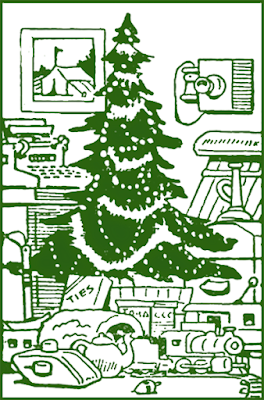"There are silver pines on the window-pane,
A forest of them," said he;
"And a huntsman is there with a silver horn,
Which he bloweth right merrily.
"And there are a flock of silver ducks
A-flying over his head;
And a silver sea and a silver hill
In the distance away," he said.
"And all of this is on the window-pane,
My pretty mamma, true as true!"
She lovingly smiled, but she looked not up,
And faster her needle flew.
A dear little fellow the speaker was--
Silver and jewels and gold,
Lilies and roses and honey-flowers,
In a sweet little bundle rulled.
He stood by the frosty window-pane
Till he tired of the silver trees,
The huntsman blowing his silver horn,
The hills and the silver seas;
And he breathed on the flock of silver ducks,
Till he melted them quite away;
And he saw the street, and the people pass --
And the morrow was Christmas day.
"The children are out, and they laugh and shout,
I know what it's for," said he;
"And they're dragging along my pretty mamma,
A fir for a Christmas-tree."
He came and stood by his mother's side:
"To-night it is Christmas eve,
And is there a gift somewhere for me,
Gold mamma, do you believe?"
Still the needle sped in her slender hands
"My little sweetheart," said she,
"The Christ Child has planned this Christmas for you
His gift that you cannot see."
The boy looked up with a sweet, wise look
On his beautiful baby-face:
"Then my stocking I'll hang for the Christ Child's gift,
To-night, in the chimney-place."
On Christmas morning the city through,
The children were queens and kings,
With their royal treasuries bursting o'er
With wonderful, lovely things.
But the merriest child in the city full,
And the fullest of all with glee,
Was the one whom the dear Christ Child had brought
The gift that he could not see.
"Quite empty it looks, oh my gold mamma,
The stoking I hung last night!
"So then it is full of the Christ's Child's gift."
And she smiled till his face grew bright.
"Now sweetheart," she said, with a patient look
On her delicate, weary face,
"I must go and carry my sewing home,
And leave thee a little space.
"Now stay with thy sweet thoughts, heart's delight,
And I soon will be back to thee."
"I'll pay, while you're gone, my pretty mamma,
With my gift that I cannot see."
He watched his mother pass down the street;
Then he looked at the window-pane
Where a garden of new frost-flowers had bloomed
While he on his bed had lain.
Then he tenderly took up his empty sock,
And quietly sat a while,
Holding it fast, and eyeing it
With his innocent, trusting smile.
"I am tired of waiting," he said at last;
"I think I will go and meet
My pretty mamma, and come with her
A little way down the street.
"And I'll carry with me, to keep it safe,
My gift that I cannot see."
And down the street, 'mid the chattering crowd,
He trotted right merrily.
"And where are you going, you dear little man?"
They called to him as he passed;
"That empty stocking why do you hold
In your little hand so fast?"
Then he looked at them with his honest eyes,
And answered sturdily:
"My stoking is full to the top, kind sirs,
Of the gift that I cannot see."
They would stare and laugh, but he trudged along,
With his stocking fast in his hand:
"And I wonder why 'tis that the people all
Seem not to understand!"
"Oh my heart's little flower!" she cried to him,
A-hurring down the street;
"And why are you out on the street alone?
And where are you going, my sweet?"
"I was coming to meet you, my pretty mamma,
With my gift that I cannot see;
But tell me why that the people laugh
And stare at my gift and me?"
Like the Maid at her Son, in the Altar-piece,
So loving she looked and mild:
"Because, dear heart, of all that you met,
Not one was a little child."
O thou who art grieving at Christmas-tide,
The lesson is meant for thee:
That thou mayst get Christ's loveliest gifts
In ways thou canst not see;
And how, although no earthly good
Seems into thy lot to fall,
Hast thou a trusting child-like heart,
Thou hast the best of all.
by Mary E. Wilkins















